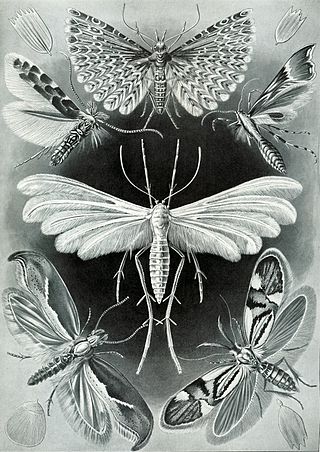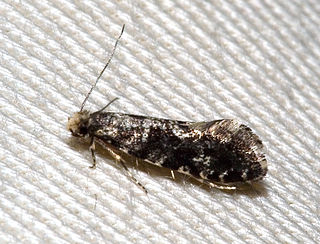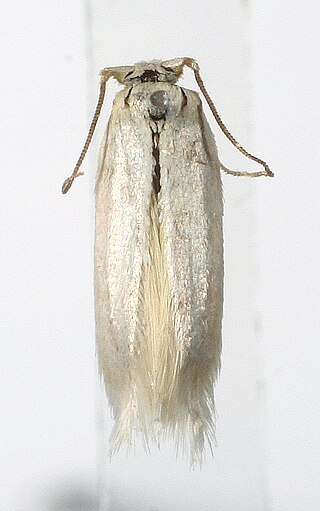
Microlepidoptera (micromoths) is an artificial grouping of moth families, commonly known as the "smaller moths". These generally have wingspans of under 20 mm, so are harder to identify by external phenotypic markings than macrolepidoptera. They present some lifestyles that the larger Lepidoptera do not have, but this is not an identifying mark. Some hobbyists further divide this group into separate groups, such as leaf miners or rollers, stem or root borers, and then usually follow the more rigorous scientific taxonomy of lepidopterans. Efforts to stabilize the term have usually proven inadequate.

Tineidae is a family of moths in the order Lepidoptera described by Pierre André Latreille in 1810. Collectively, they are known as fungus moths or tineid moths. The family contains considerably more than 3,000 species in more than 300 genera. Most of the tineid moths are small or medium-sized, with wings held roofwise over the body when at rest. They are particularly common in the Palaearctic, but many occur elsewhere, and some are found very widely as introduced species.

Yponomeutoidea is a superfamily of ermine moths and relatives. There are about 1,800 species of Yponomeutoids worldwide, most of them known to come from temperate regions. This superfamily is one of the earliest groups to evolve external feeding and to colonize herbs in addition to shrubs and trees.

Lyonetiidae is a family of moths with some 200 described species. These are small, slender moths, the wingspan rarely exceeding 1 cm. The very narrow forewings, held folded backwards covering the hindwings and abdomen, often have pointed apices noticeably up- or down-turned. The larvae are leaf miners.

Opostegidae or "white eyecap moths" is a family of insects in the order Lepidoptera that is characterised by particularly large eyecaps over the compound eyes. Opostegidae are most diverse in the New World tropics.

The insect order Lepidoptera consists of moths, most of which are night-flying, and a derived group, mainly day-flying, called butterflies. Within Lepidoptera as a whole, the groups listed below before Glossata contain a few basal families accounting for less than 200 species; the bulk of Lepidoptera are in the Glossata. Similarly, within the Glossata, there are a few basal groups listed first, with the bulk of species in the Heteroneura. Basal groups within Heteroneura cannot be defined with as much confidence, as there are still some disputes concerning the proper relations among these groups. At the family level, however, most groups are well defined, and the families are commonly used by hobbyists and scientists alike.
Bedellia struthionella is a moth of the family Bedelliidae. It was first described by Lord Walsingham in 1907. It is endemic to the Hawaiian islands of Oahu and Hawaii.
Bedellia boehmeriella is a moth of the family Bedelliidae. It was first described by Otto Swezey in 1912. It is endemic to the Hawaiian island of Oahu.
Bedellia oplismeniella is a moth of the family Bedelliidae. It was first described by Otto Swezey in 1912. It is endemic to the Hawaiian Islands, specifically to Oahu and possibly Molokai and Hawaii.
Bedellia orchilella, the Hawaiian sweet potato leaf miner, is a moth of the family Bedelliidae. It was first described by Lord Walsingham in 1907. It is endemic to the Hawaiian islands of Kauai, Oahu, Molokai, Maui and Hawaii.

Bedellia somnulentella, the sweet potato leaf miner, is a moth in the family Bedelliidae.
Bedellia ehikella is a moth in the family Bedelliidae. It is found in Ukraine, Spain, Sardinia, Italy, Croatia, the Czech Republic and Hungary.
Bedellia silvicolella is a moth in the family Bedelliidae. It is endemic to the Canary Islands.
Bedellia yasumatsui is a moth in the Bedelliidae family. It is known from Australia and Papua New Guinea.
Bedellia cathareuta is a moth of the family Bedelliidae. It is known from South Africa.
Bedellia spectrodes is a moth in the family Bedelliidae. It was described by Edward Meyrick in 1931. It is found in India.
Bedellia enthrypta is a moth in the family Bedelliidae. It is found in India.
Bedellia minor, the Florida morning-glory leafminer moth, is a moth in the family Bedelliidae. It is found in Florida in the United States and on Cuba.

Bedellia psamminella, the convolvulus skeletoniser, is a moth in the family Bedelliidae. It is found in New Zealand.








